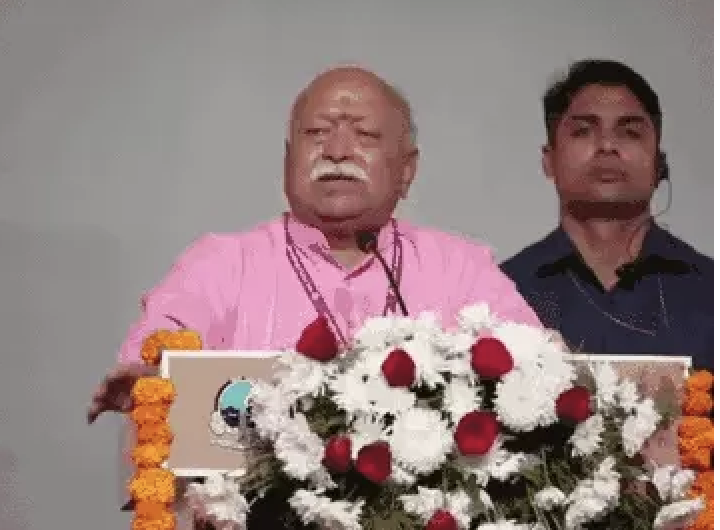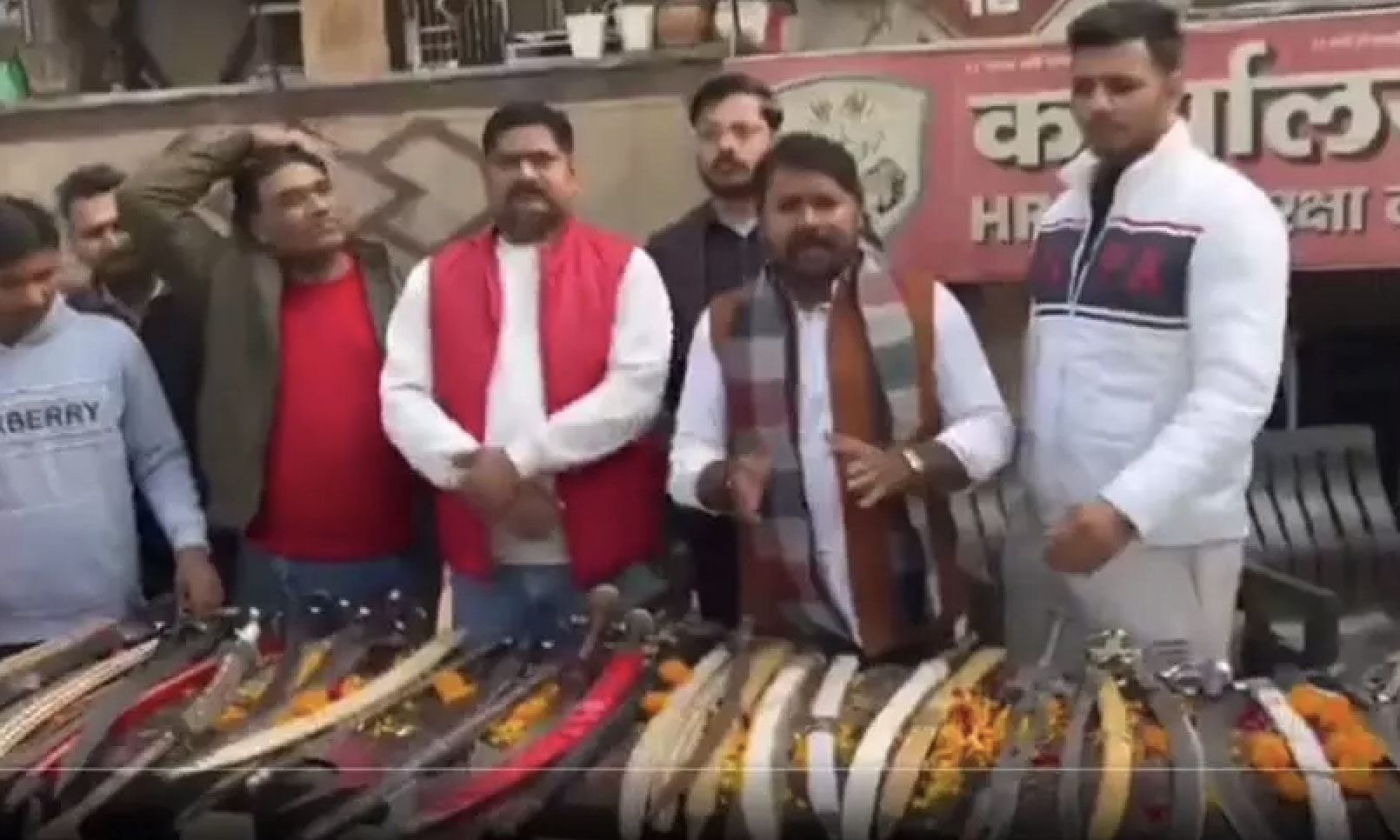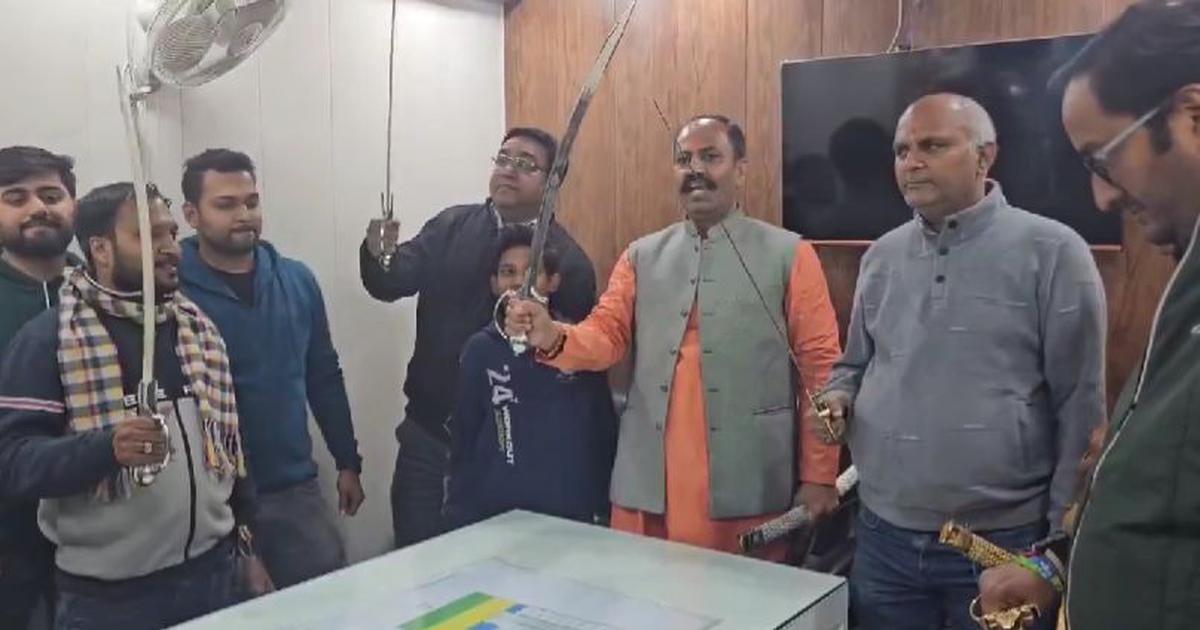
By Abhik Bhattacharya, Arshad Raza Khan and Souvik Manna / The Wire
Ranchi: With ‘bulldozer justice’ becoming the new norm, a Muslim-majority slum at Rasaldarnagar of Doranada in Ranchi is on verge of becoming its new victim.
On May 19, 2022, circle officer of Argora, Arvind Kumar Onjha, had sent a show cause notice to Muslims who had been residing beside the Harmu river for more than 30 years. The notice titled ‘Under Section 3 of The Jharkhand Public Land Encroachment Act, 1956’ asked the residents to appear before the circle officer on May 23 and ‘show cause why the encroachment shall not be removed’.
Currently, around 1,200 people stay at the riverbank across the east side of the Ranchi main road overbridge.
On May 23, the Rasaldarnagar slum residents submitted their ration cards, municipality tax receipts, Aadhaar cards, electricity bills (for a few since 1991) to establish their ties to the land known in the government records as ‘Khata No. 213, Plot 24, Area 2 dic, Mauja- Doranda, Thana No- 223, P.S: Doranda’.
The circle officer has told them that he would look into the documents carefully before taking any decision on this matter. However, this is not the first time they have received such a notice, as the history of this poor Muslim slum is sparse with continuous threats of bulldozers.
Setting the ground
Rasaldarnagar, which is situated at the juncture of Ranchi’s main city and river Doranda, is mostly occupied by Muslims. According to Ramaranjan Sen’s book Smriti Manjusha, Doranda is made up of two words – ‘durang’ which means songs (gaana) and ‘da’ (paani) which means water.
The etymological understanding of Doranda’s name is significant as this river has been a matter of contention for almost a decade in Ranchi. Around 2013, Ashoka Bhagat of Vikash Bharti, a Rashtriya Swayamsevak Sangh-affiliated social organisation, along with the Citizen Foundation, had organised a long-term movement called ‘Harmu Nadi Banchao Abhiyan’, aimed at clearing out garbage and illegal settlements from the river’s bank. They had also conducted a ‘river puja’, taking the vow to restore its earlier glory.
Responding to a public interest litigation (PIL) filed by some environmental activists in 2010, the Jharkhand high court had asked the Ranchi Municipal Corporation (RMC) whether drain water passes through the river. In its 2013 order, it had also instructed them to submit action plans taken to remove the illegal encroachments in the riverbed. After the intervention of the high court, the Jharkhand government in 2015 directed Jharkhand Urban Development Corporation (JUDCO) to clean the Harmu river.
As per people and the local authorities, the contested area across the riverbank and riverbed are mostly occupied by poor Muslims. Therefore, their households become the major target of anti-encroachment drives in the cloak of environmental activism.
The settlements of Rasaldarnagar slum and threats of evictions
Named after Rasaldar Baba, who was a commandant in the British Gorkha Regiment during early the 19th century, Rasaldarnagar is comparatively a new settlement at Doranda. It was only after the 1967 riots that Muslim employees of Heavy Engineering Corporation Ltd (HEC) left their quarters and started settling down in these localities.
Rasaldarnagar and Arvind Nagar thus grew up as a Muslim mohalla, besides Gowalatoli which had had been a settlement for more than 200 years. J.N. Basu and L.P. Vidyarthi in their survey of an industrial city published in 1962, mentioned the name of Gowalatoli as one of the oldest Muslim areas in Ranchi. The presence of Rasaldar Baba Mazhar (shrine) and the people of Gowalatoli made it a safe space for employed upper-class Muslims, who had left their HEC quarters during riots.
In between 1970-1985, the population grew extensively across the area and spilled over the Harmu riverbank. The poor Muslims of Gowalatoli first started making their huts near the river marked as GM-Khas lands. Both the desire to stay in a community and the restraints imposed by communally charged up environments on the mobility of Muslims left them with no other space to settle down. At this time there was no proper school within 2 kilometres of the area.
Against this backdrop, Muslims of three mohallas (Gowalatoli, Rasaldarnagar and Arvind Nagar) founded an English medium school, Iqbal Academy, in 1983, with their own contribution. Abdul Razak Ansari, then MLC of Bihar government, inaugurated the school campus in 1986.
Since the beginning, the uncertainty of land became one of the major concerns for the school managing committee. On March 15, 1987, they had submitted a letter to the deputy collector, requesting for the regularisation of the land and initiating a provision for an extended school building for the accommodation of the increasing number of students.
In response, the deputy collector had sent the letter to the then circle officer for conducting a survey. After looking into the school, the circle officer gave them a pramanpatra notification on August 2, 1988. Thereafter, the managing committee under the leadership of Shamim Ahmed (secretary) etched a boundary wall around the school. They, however, submitted another petition to the deputy collector on December 11, 1989 in this regard but went in vain.
On February 9, 2003, for the first time, Iqbal Academy received a notice from the circular office ‘for the removal of the school building by February 15, 2003’. In its response filed on February 12, 2003, the managing committee mentioned how they have been helping to build the nation through imparting education among poor citizens of the country.
On the high moral ground of nation-building, they sought exemption and subsequent regularisation of the land. With the deputy collector’s intervention, the eviction notice was not acted upon.
Following the passing of the Right to Education Act, 2009, the Union government took Iqbal Academy within its purview of Sarva Shiksha Abhiyan in 2013. However, apart from this registration number and a few sporadic donations, Iqbal Academy didn’t get any substantial governmental support.
Beautification of Harmu River: environmentalism as a cloak?
As mentioned earlier, in 2015, the Jharkhand government under the directions and encouragement of higher judiciary and environmentalists who are also Hindutva activists, took upon what is called the ‘Rejuvenation and Conservation of Harmu River Project,’ signed by JUDCO, Ranchi Municipal Corporation (RMC) and Eagle Infra India Ltd., a Mumbai-based NGO. Among the major motives of the project was the eviction of ‘illegal’ settlements across the riverbank.
Citing this ground on January 13, 2017, the circle officer served another eviction notice to both Iqbal Academy and the residents of the riverbank slums. Then the managing committee of the school filed a writ petition in the Jharkhand high court. However, the high court on February 7, 2017 disposed of the petition and asked the petitioner to appeal to the deputy collector, appellate authority, within 15 days and ordered a status quo in case of Iqbal Academy up to March 31, 2017.
Meanwhile, as subsequent communications from the circle officer showed, the plan to demolish the school was progressing. In the background of the eviction notice sent in January lies an order passed by the circle officer on December 8, 2016. In its order, the officer instructed the Amin of Argora to measure the land occupied by Iqbal Academy by January 13. It mentioned that the school was occupying 23 decimals within 2.4 acres land in the riverbank.
In its following notice on January 27, 2017, the circle officer declared that the school was running in violation of 6 (II) of Jharkhand Public Land Encroachment Act, 1956 as they were occupying riverbeds without required documents. February 2 was notified as the day of demolition. Already in the preceding weeks, most of the houses across Rasaldarnagar slum (river bank area) near the school were brutally demolished, affecting the people in the camps..
However in the night of February 1, Shamim Ahmed had forwarded a copy of a Supreme Court order delivered by Markandey Katju and Gyan Sudha Mishra in Jagpal Singh & Ors. vs State of Punjab & Ors. A civil appeal to the then chief secretary was sent, citing the exceptions mentioned in Friends Colony Development Committee vs State of Orissa.
In its order, the Supreme Court noted: ‘Even where the law permits compounding of unsanctioned constructions, such compounding should only be by way of an exception. In our opinion this decision will apply with even greater force in cases of encroachment of village common land. Ordinarily, compounding in such cases should only be allowed where the land has been leased to landless labourers or members of the scheduled caste/ scheduled tribes, or the land is actually being used for public purpose of the village e.g. running a school for the villagers, or a dispensary for them’. The court also mentioned that the copies of the order should be sent to all chief secretaries of the states and the Union territories in India.
Despite this last moment effort by Ahmed to remind the administration of its obligations in compliance with the Supreme Court verdict, next morning the police forces gathered in huge numbers along with the circle officer, deputy collection, and other administrators to bulldoze the school. Ahmed then further contacted the chief secretary and told her that he would file a contempt case against her if the school was demolished.
Within few minutes of this communication, as told by Ahmed and other activists, the forces withdrew from the spot and passed a subsequent notice saying that as the school sought more time for giving back their benches and tables to Mecon (from which it borrowed several pieces of furniture), the authority would let it function until February 7. The high court stay order on the same day nonetheless had put the demolition drive in abeyance at least for the time being.
For the already demolished houses, the authorities measured the breadth of Harmu river passing through this locality and demarcated the area beyond which any housing would not be allowed. People further started resettling their houses besides the debris of their earlier lives.
‘We will not let Jharkhand become UP or MP’
As the recent notice dated May 19, 2022 reached the banks of Harmu, people are no longer panicking, rather they are convinced that this time they would together resist any efforts of demolition.
Citing the verdict of Arun Mishra on Adverse Possession (Ravinder Kaur Grewal vs Manjit Kaur, 2019), Shamim Ahmed told The Wire, “We will see the end this time. We will fight together and win.”
“Where should we go? We are poor people. Once you threw us out and we accepted our fate and reconstructed the house. How many times would you do the same? We are Muslims. We can’t stay everywhere. We have been staying here for more than three-four decades. In between we tried to settle in Namkum and were forced out for being Muslims What do you expect of us? said Abdul, who is in his early 60s and has been fighting for shelter since his childhood.
Another wage worker Naseem (41), who lost his job during COVID-19 19 recalled Islamnagar demolition of 2011 that had spread fears among the Muslim slums across the city and said- “I have five children. Two of them go to school. How would we survive if regularly we are being forced to change our houses?”.
Shamima Ahsana (50), who works as a maid in nearby houses, was very clear in her conviction that this time nobody would be able to remove them. “Our families have been staying here for around 50 years. Our everything is connected to this land. We will go away, but for that you give me a resettlement. That’s all that we want,” she said.
This time, the people fighting for shelter are demanding resettlement and are prepared with their documents as well. Naeem showed us his electricity bills of the last 30 years, municipality tax receipts of two decades along with several other relevant documents. Such deliberate documentation is a product of their double marginalisation both as Muslim and as poor.
However, the discrimination faced by the Muslims in comparison to their non-Muslim brethren were vivid in their statements. Javed, an activist, told us, “There are huge non-Muslim settlements across the riverbank at Hospital lane, Tapoban Mandir, but you would not find anybody receiving a notice. They have been encroaching the lands for decades. The temple is situated almost on the river, still nobody would tell them anything. They have impunity of being non-Muslim.”
We also found that several houses of different communities that were almost sliding into the river, in the west of the overbridge, have not been served any notice.
Ward councillor, Naseem Gaddi, told us: “We will not let it become UP or MP. The bulldozer justice would not work here. We will fight tooth and nail for the justice of the people”.
The circle officer has told them that he would send someone again to measure whether demarcations are being followed properly. However, Javed finds discrepancy in the words of the officer as during their conversation, he focused much on the category of ‘river land’ and tried to find lacunae in the referred Supreme Court verdicts.
Circle officer Arvind Kumar Onjha told The Wire that this is just a primary notice and he has received the submissions of the school and the people. He will look into it and if he finds that they have not encroached the riverbeds, the charges may be dropped. But if he finds them violating section 3 of Jharkhand Public Land Encroachment Act, he will take action against them under section 5 and a final notice of removal of encroachment would be passed.
“If they don’t remove encroachment on their own, the local administration will remove the encroachment forcefully and the cost which will occur in removing the encroachment will be paid by the encroachers,” he added.
When we contacted the local Bharatiya Janata Party (BJP) MLA of Hatia constituency, Naveen Jaiswal, we found that he is not aware of the eviction notice. He even asked us which place we were referring to. Such ignorance of most of the political classes regarding the fate of thousands of poor Muslims makes it further a non-issue in media parlance.
As we were about to leave, one of the residents, Ikram, showed us the token which was given to him in 1998 by the RMC, demarcating his plot. In his words we found despair and hope together: “We were even given tokens of the plot but still, we are repeatedly forced to vacate the land. Allah knows best what will happen to us.”
Despite several government facilities and RMC tax imposition that legitimises them as residents of the area, the people residing at the river bank are eagerly waiting for the verdict of the circle officer. Our in-depth research and experience in Islamnagar made us recall an Urdu couplet that Khurshid, an evicted tea-seller once told us:
log Tuut jaate haiñ ek ghar banāne meñ
tum taras nahīñ khāte bastiyāñ jalāne meñ. (Bashir Badr)
All names have been changed in this story to protect identities.
This article first appeared on thewire.in






